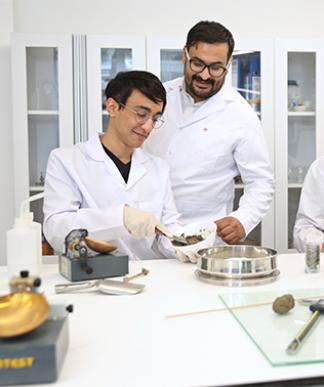


About the Department
Today, with the rapid improvement of technology in the sectors of machinery, electronics, computer hardware and computer software, alongside the development of industrial automation, we have started to use intelligent machines and robots in the industry, leading to a need for a new engineering field that can find a place in all stages of development of these new technologies. A mechatronic product consists of motor systems used for generating mechanical power, transferring power, sensors for sensing changes, microprocessor for controlling the system, and computer programs that control the entire system or machine in a central or distributed structure. Mechatronics engineering is a combination of mechanical engineering, electrical-electronics engineering and computer engineering in order to design and manufacture the above mentioned technologies. The Mechatronics Engineering Program trains qualified engineers who can utilize time, resources, and work power effectively and make technological designs by using current technology and engineering productivity in the most productive way, while considering environmental factors.
Education Opportunities
The Education and training activities in the Department of Electrical and Electronic Engineering are offered in laboratories equipped with state-of-the-art equipment, and in classrooms with all the up-to-date technological facilities. There are eight faculty members who have completed postgraduate degrees in qualified and well-known universities. Mechatronics engineering students also take courses from the Departments of Mechanical Engineering and Computer Engineering, as well as the Department of Electrical and Electronics Engineering. Thus, our courses are carried out in a multi-disciplinary manner and with the collaboration of students from different disciplines. The faculty is composed of experienced academics who continue their scientific studies in their own fields of expertise, by supervising theses for postgraduate students. The program is taught in English and due to this, our students will be able to easily follow references written in English and improve themselves, while working on their courses and practicing their profession throughout life.

Career Areas
Mechatronics engineering has a wide range of applications and working areas. It is a necessity for the human race to get help from machines to do challenging tasks, that require fine work and detailed in a way that is beyond human sensitivity, or too dangerous. Mechatronic engineers play a major role in designing and manufacturing these machines. Mechatronics engineering practices include: health robots, agricultural robots, the automotive industry, micro electromechanical systems (MEMS), flying robots, robot vision, industrial automation, smart weapons and weapons systems, micro robots, mobile robots, and industrial robots. Industrial companies operating in these fields throughout the world need qualified engineers and the Cyprus International University Mechatronics Engineering Program provides engineers with the qualifications needed by these companies.
Contact
Faculty of Engineering
Science and Technology Center, ST 226
Tel: +90 392 671 1111 Extension: 2401
Faculty E-mail: secretary-fe@ciu.edu.tr
Head of Department: Prof. Dr. Mehmet KUŞAF
Head of Department E-mail: mkusaf@ciu.edu.tr
Compulsory Courses
First Semester
GENERAL CHEMISTRY
Course code
CHEM110Credit
4Theoretical
3Practical
2Ects
6INTRODUCTION TO COMPUTING
Course code
CMPE101Credit
3Theoretical
2Practical
2Ects
5ENGINEERING DRAWING
Course code
CVLE101Credit
3Theoretical
2Practical
3Ects
5READING AND WRITING SKILLS-I
Course code
ENGL141Credit
3Theoretical
2Practical
2Ects
4HISTORY OF CIVILIZATION
Course code
HIST100Credit
0Theoretical
2Practical
0Ects
2CALCULUS-I
Course code
MATH101Credit
4Theoretical
3Practical
2Ects
5LINEAR ALGEBRA
Course code
MATH121Credit
2Theoretical
2Practical
0Ects
3MODERN TURKISH HISTORY
Course code
TARH100Credit
0Theoretical
2Practical
0Ects
2Second Semester
INTRODUCTION TO PROGRAMMING
Course code
CMPE112Credit
4Theoretical
3Practical
2Ects
6DIGITAL LOGIC DESIGN
Course code
EELE221Credit
4Theoretical
3Practical
2Ects
5READING AND WRITING SKILLS-II
Course code
ENGL142Credit
3Theoretical
2Practical
2Ects
4CALCULUS-II
Course code
MATH102Credit
4Theoretical
3Practical
2Ects
5INTRODUCTION TO MECHATRONIC ENGINEERING
Course code
MCTE100Credit
0Theoretical
1Practical
0Ects
2GENERAL PHYSICS-I
Course code
PHYS101Credit
4Theoretical
3Practical
2Ects
6TURKISH LANGUAGE
Course code
TREG100Credit
0Theoretical
2Practical
0Ects
2TURKISH
Course code
TURK100Credit
0Theoretical
2Practical
0Ects
2Third Semester
ENGINEERING MECHANICS-I
Course code
CVLE211Credit
4Theoretical
4Practical
1Ects
6MATERIALS SCIENCE
Course code
CVLE224Credit
4Theoretical
4Practical
1Ects
6DIFFERENTIAL EQUATIONS
Course code
MATH203Credit
3Theoretical
3Practical
1Ects
5INTRODUCTION TO PROBABILITY AND STATISTICS
Course code
MATH205Credit
4Theoretical
4Practical
1Ects
6GENERAL PHYSICS-II
Course code
PHYS102Credit
4Theoretical
3Practical
2Ects
6Fourth Semester
CIRCUIT THEORY I
Course code
EELE202Credit
4Theoretical
3Practical
2Ects
6LINEAR CONTROL SYSTEMS
Course code
EELE326Credit
4Theoretical
4Practical
1Ects
6MATHEMATICAL METHODS FOR ENGINEERS
Course code
MATH202Credit
4Theoretical
3Practical
2Ects
5ENGINEERING MECHANICS-II
Course code
MCLE222Credit
4Theoretical
4Practical
1Ects
7STRENGHT OF MATERIALS
Course code
MCLE270Credit
4Theoretical
3Practical
2Ects
7Fifth Semester
ELECTRONICS I
Course code
EELE341Credit
4Theoretical
3Practical
2Ects
7THERMODYNAMICS
Course code
ENRE301Credit
4Theoretical
3Practical
2Ects
7ELECTROMECHANICAL ENERGY CONVERSION
Course code
ENRE305Credit
4Theoretical
3Practical
2Ects
5DYNAMICS OF MACHINERY
Course code
MCLE301Credit
4Theoretical
4Practical
1Ects
6MACHINE ELEMENTS I
Course code
MCLE371Credit
3Theoretical
3Practical
1Ects
5Sixth Semester
SIGNALS & SYSTEMS
Course code
EELE321Credit
4Theoretical
4Practical
1Ects
7MICROPROCESSORS
Course code
EELE324Credit
4Theoretical
3Practical
2Ects
7MANUFACTURING TECHNOLOGY
Course code
MCLE312Credit
4Theoretical
4Practical
1Ects
7MECHATRONICS COMPONENTS AND INSTRUMENTATION
Course code
MCTE326Credit
3Theoretical
3Practical
1Ects
4AREA ELECTIVE
Course code
MCTEXX1Credit
3Theoretical
3Practical
0Ects
5Seventh Semester
ROBOTICS
Course code
EELE411Credit
3Theoretical
3Practical
1Ects
5PROJECT MANAGEMENT
Course code
ENGI401Credit
3Theoretical
3Practical
0Ects
4EXPERIMENTAL METHODS
Course code
MCLE403Credit
3Theoretical
2Practical
3Ects
5COMPUTER AIDED DESIGN
Course code
MCLE475Credit
3Theoretical
2Practical
3Ects
6SUMMER TRAINING
Course code
MCTE300Credit
0Theoretical
0Practical
0Ects
5AREA ELECTIVE
Course code
MCTEXX2Credit
3Theoretical
3Practical
0Ects
5Eighth Semester
CAPSTONE PROJECT
Course code
ENGI402Credit
4Theoretical
2Practical
4Ects
8ENGINEERING ECONOMY
Course code
INDE232Credit
3Theoretical
3Practical
0Ects
4AREA ELECTIVE
Course code
MCTEXX3Credit
3Theoretical
3Practical
0Ects
5AREA ELECTIVE
Course code
MCTEXX4Credit
3Theoretical
3Practical
0Ects
5UNIVERSITY ELECTIVE
Course code
UNIEXX1Credit
3Theoretical
3Practical
0Ects
4UNIVERSITY ELECTIVE
Course code
UNIEXX2Credit
3Theoretical
3Practical
0Ects
4Elective Courses
PROGRAMMING IN MATLAB FOR ENGINEERING
Course code
ENGI316Credit
3Theoretical
3Practical
0Ects
WIND ENERGY TECHNOLOGY
Course code
ENRE312Credit
3Theoretical
3Practical
0Ects
CONVENTIONAL AND ALTERNATIVE ENERGY RESOURCES
Course code
PNGE452Credit
3Theoretical
3Practical
0Ects
0HEATING VENTILATION AND AIR CONDITIONING
Course code
MCLE443Credit
3Theoretical
3Practical
0Ects
5MACHINE DESIGN
Course code
MCLE476Credit
3Theoretical
3Practical
0Ects
DIGITAL SIGNAL PROCESSING
Course code
EELE420Credit
3Theoretical
3Practical
0Ects
PROGRAMMABLE LOGIC CONTROLLERS
Course code
EELE415Credit
4Theoretical
3Practical
2Ects
6EMBEDDED SYSTEMS
Course code
CMPE455Credit
3Theoretical
3Practical
0Ects
5DIGITAL CONTROL SYSTEMS
Course code
EELE403Credit
3Theoretical
3Practical
1Ects
ADVANCED DIGITAL ELECTRONICS
Course code
EELE322Credit
3Theoretical
3Practical
1Ects
0ARTIFICIAL INTELLIGENCE
Course code
CMPE415Credit
3Theoretical
3Practical
1Ects
7ENERGY EFFICIENCY AND MANAGEMENT
Course code
ENRE308Credit
3Theoretical
3Practical
0Ects
5BIOMEDICAL ENGINEERING AND INSTRUMENTATION
Course code
BIOE303Credit
3Theoretical
2Practical
2Ects
5GEOTHERMAL ENGINEERING
Course code
PNGE391Credit
3Theoretical
3Practical
0Ects
5IOT FOR ENGINEERING
Course code
ENGI416Credit
3Theoretical
2Practical
2Ects
5THERMAL SYSTEMS DESIGN
Course code
MCLE445Credit
4Theoretical
3Practical
2Ects
6INTRODUCTION TO CRYPTOGRAPHY AND NETWORK SECURITY
Course code
CMPE336Credit
3Theoretical
3Practical
0Ects
ENERGY SYSTEMS MODELING, ANALYSIS AND SIMULATION
Course code
ENRE304Credit
4Theoretical
3Practical
2Ects
7ETHICS
Course code
INDE335Credit
3Theoretical
3Practical
0Ects
4ENGINEERING MANAGEMENT
Course code
INDE282Credit
3Theoretical
3Practical
0Ects
4CLOUD COMPUTING
Course code
CMPE481Credit
3Theoretical
3Practical
0Ects
COMPUTER AIDED DATA ANALYSIS
Course code
INDE491Credit
3Theoretical
3Practical
0Ects
OCCUPATIONAL HEALTH & SAFETY
Course code
INDE492Credit
3Theoretical
3Practical
1Ects
6COMPUTER SIMULATION
Course code
CMPE485Credit
3Theoretical
3Practical
0Ects
THERMAL POWER ENGINES
Course code
MCLE446Credit
3Theoretical
3Practical
0Ects
SURGICAL INSTRUMENTATION
Course code
MEDE402Credit
3Theoretical
3Practical
0Ects
ENVIRONMENTAL IMPACT ASSESSMENT
Course code
ENVE402Credit
3Theoretical
3Practical
0Ects
MANAGEMENT INFORMATION SYSTEMS
Course code
ISYE363Credit
3Theoretical
3Practical
0Ects
4ELECTRICAL MACHINERY
Course code
EELE453Credit
3Theoretical
3Practical
1Ects
6ENVIRONMENTAL MANAGEMENT
Course code
ENVE407Credit
3Theoretical
3Practical
0Ects
5MOBILE APPLICATION DEVELOPMENT
Course code
CMPE425Credit
3Theoretical
3Practical
0Ects
WELL LOGGING
Course code
PNGE350Credit
3Theoretical
3Practical
0Ects
6CONVENTIONAL AND ALTERNATIVE ENERGY RESOURCES
Course code
PNGE452Credit
3Theoretical
3Practical
0Ects
0ARTIFICIAL ORGANS
Course code
BIME404Credit
3Theoretical
3Practical
0Ects
COAL GAS PRODUCTION
Course code
PNGE392Credit
3Theoretical
3Practical
0Ects
5TR Applicants
TR Students who are successful in the exams conducted by the Higher Education Council Student Selection and Placement Center (ÖSYM) and are entitled to enroll in our university in line with their preferences can complete the registration process with the necessary documents for registration from our Registration and Liaison Offices throughout Turkey or from the Marketing Directorate on campus.
Click for detailed admission requirements information.
TRNC Applicants
TRNC citizens and TR citizen candidate students who have completed their entire high school education in TRNC. They are placed in undergraduate programs in line with their success in the CIU Student Placement and Scholarship Ranking Exam and the programs they prefer.
Students who are successful in the exam can register from the TRNC Marketing Office.
Applicants can directly apply online to our undergraduate programs by using the application portal. Please fill in your details correctly and upload all the required documents listed on the last page of the application form.
Required documents;
- Completed application form,
- Higher/Secondary Certificate or equivalents (e.g. O/A’Level, WAEC/NECO)
- Evidence of English Language competence: TOEFL (65 IBT) or IELTS (5.5). Students without these documents will take the CIU English proficiency exam on campus following arrival,
- Scanned copy of international passport/birth certificate,
- Fully completed and signed CIU Rules and Regulations document (which can be downloaded during the online application).
Cyprus International University provides academic scholarships for its students as an incentive for success, with most students benefiting from 50%, 75% or 100% scholarships or discounted tuition fees. Click for more information.
Tuition Fees are determined at the beginning of each academic year. Candidate students who are entitled to enroll in CIU can learn their fees in line with the Tuition Fee Calculation system.
Program Outcomes
Mechatronics Engineering program outcomes cover all knowledge, skills and behavioral components necessary to achieve the educational objectives of the program.
PO1: Have sufficient knowledge of the topics specific to the disciplines of mathematics, science and mechatronics engineering; acquire the ability to use theoretical and practical knowledge of these areas in complex engineering problems.
PO2: Have the ability to identify, define, formulate and solve complex engineering problems related to mechatronics engineering; acquire the ability to select and apply appropriate analysis and modeling methods for this purpose.
PO3: Have the ability to design a complex system, device or product related to mechatronics engineering by applying modern design methods under authentic constraints and conditions to meet specific requirements.
PO4: Have the ability to develop, select and use modern techniques and tools necessary for the analysis and solution of complex problems encountered in mechatronics engineering practices; have the ability to use information technologies effectively.
PO5: Have the ability to design and conduct experiments, collect data, analyze and interpret results to investigate complex mechatronics engineering problems or discipline-specific research topics.
PO6: Have the ability to work effectively in disciplinary and multidisciplinary teams and individually.
PO7: Have the ability to communicate effectively in oral and written English; have knowledge of at least one foreign language; write effective reports and understand written reports, prepare design and production reports, make effective presentations, give clear and understandable instructions.
PO8: Have the awareness on the necessity of lifelong learning; gain the ability to access information, follow developments in science and technology and continuously renew their knowledge and skills.
PO9: Behave in accordance with the ethical principles, show awareness of professional and ethical responsibility; learn about the standards used in engineering practices.
PO10: Have knowledge of business practices such as project management, risk management and change management; awareness of entrepreneurship and innovation; have knowledge about sustainable development.
PO11: Have knowledge about the impact of mechatronics engineering practices on health, environment and safety at universal and social levels as well as the problems of the current era; have knowledge about the legal consequences of engineering solutions.